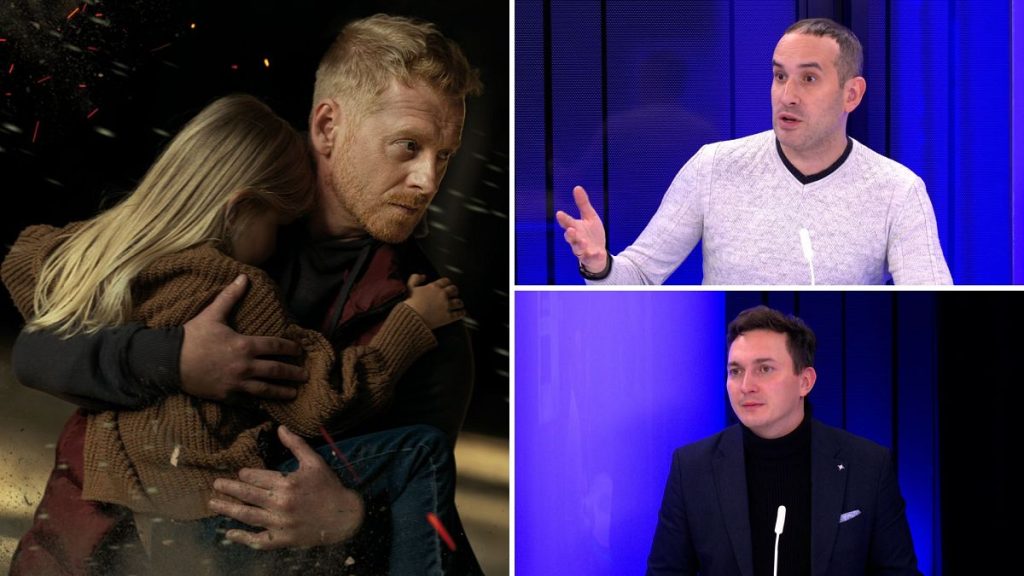“Bucha,” a gripping narrative film shot in Ukraine amidst the ongoing conflict, unveils the untold stories of civilian heroism during the Russian invasion. The film centers on the real-life experiences of Konstantin Gudauskas, a Kazakhstani citizen who risked his life to rescue over 200 people from occupied territories, including Bucha, in the spring of 2022. The film, which premiered at the Warsaw Film Festival and has been screened at the European Parliament, aims to counter Russian propaganda by presenting a raw and authentic portrayal of the war’s impact on ordinary Ukrainians. Interweaving the narratives of real individuals who endured the horrors of the occupation, “Bucha” offers a powerful testament to the resilience and courage of those caught in the crossfire.
The film’s creation posed a significant challenge for producer and screenwriter Oleksandr Shchur, who transitioned from writing comedies to documenting the stark realities of war. Shchur emphasizes the importance of telling these stories now, drawing parallels to films made during World War II and more recent conflicts like the Iraq War. He argues that while numerous films about the Ukrainian war will likely emerge in the future, “Bucha” serves as a crucial first step in countering the misinformation propagated by Russia. The film’s commitment to authenticity is underscored by its extensive end credits, which feature the real names, photos, and stories of the Ukrainian characters portrayed, along with a companion documentary detailing the film’s production.
The screening of “Bucha” at the European Parliament garnered a strong emotional response, with viewers deeply moved by the film’s depiction of human resilience in the face of unimaginable cruelty. Vasyl Kushmuns, Vice President of Promote Ukraine, highlighted the film’s nuanced portrayal of the Russian antagonists, not as caricatures but as educated individuals who chose the side of evil. The film underscores the universality of the struggle against injustice, emphasizing that standing up for what is right transcends nationality and origin. European Parliament Vice President Pina Picierno praised the film and advocated for its wider distribution throughout the EU, recognizing its power to convey the truth about the war’s impact on civilians.
“Bucha” aims to reach a global audience, with distribution already secured in Canada and ongoing negotiations for releases in other countries, including Portugal and Poland. The filmmakers aspire to expand the film’s reach beyond Europe to North and South America and Asia, ensuring that these critical stories are heard worldwide. The film’s focus on civilian experiences offers a unique perspective on the war, shifting the narrative away from the traditional emphasis on soldiers and battlefronts. By showcasing the heroism of ordinary Ukrainians who became saviors amidst the chaos, “Bucha” illuminates the pervasive impact of the conflict on every facet of life in Ukraine.
The film highlights the moral dilemmas faced by individuals caught in the war’s grip, showcasing the difficult choices they were forced to make. One poignant scene depicts a young girl escaping a torture camp, stepping over the body of a man who sacrificed himself to protect her from sexual assault. This stark portrayal of human suffering underscores the brutality of the conflict and the courage of those who risked their lives to help others. The film’s narrative also explores the evolution of the protagonist, Konstantin Gudauskas, from initial hesitation to unwavering bravery in the face of danger. This transformation emphasizes the power of individual choice and the capacity for courage to emerge even in the most dire circumstances.
The narrative arc of Konstantin Gudauskas’ character reflects a deepening commitment to helping those in need. Initially reluctant to involve himself, he gradually embraces the role of rescuer, driven by a growing sense of responsibility and empathy. A pivotal moment occurs when a young girl tells him that brave people are also scared, but the difference lies in their willingness to keep moving forward despite their fear. This encounter inspires Gudauskas to persevere, ultimately leading him to confront Russian soldiers directly, declaring that they have no right to dictate the fate of Ukraine. This act of defiance encapsulates the film’s central message: that even in the face of overwhelming adversity, the human spirit can endure and resist oppression.














